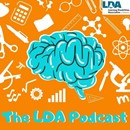By Toby Tomlinson Baker, LDA Harrison Sylvester award recipient 2020 and Ph.D. candidate
Many people assume that students with disabilities outgrow their disability as they age, yet this is a misconception. Many adults are successful postsecondary students with disabilities (SWDs). As a Ph.D. candidate at Pepperdine University, I have discovered that students with disabilities must self-advocate to professors and to the Accessibility Office to receive their appropriate accommodations. Even as a Ph.D. scholar, I had to routinely request accommodations each semester and go out of my way to speak to my new professors about assignments.
As a student with a learning disability and ADHD, self-advocacy is the reason I am so successful in school. As an adult with a Learning Disability and ADHD, I have often had to self-advocate in school settings, particularly in graduate school, as a Ph.D. scholar, to get the services I needed to succeed.
Before COVID-19, I had the honor of receiving the LDA Harrison Sylvester Award at the national conference in Orlando for being a scholar with a disability who has contributed to academic research. In receiving this honor, I noticed how my journey to becoming a Ph.D. candidate was not as easy as a postsecondary student with a disability.
As a child, I had been diagnosed with a Learning Disability. Schoolwork took me longer to complete, my teachers became discouraged, and consequently, I transferred schools 6 times during my K-12 experience before high school graduation. Teachers told my parents and me that I would never get admitted to a four-year college, but I did – and I graduated on time.
As an undergraduate student, I was determined to pass all of my classes. I often attended professors’ office hours, talking with the professors, getting information about upcoming tests and papers, and making sure I took good notes. I’m sure I drove my professors crazy, but I graduated with a 3.9 GPA, so it worked. What did I do? I self-advocated.
As a researcher, I discovered that SWDs may be diverted from academic tracks or told to take certain courses that are identified as “easier.” This may have consequences when they reach higher education. High school seniors may intentionally be discouraged from applying to four-year programs by influential people such as counselors, parents, and teachers. Furthermore, seniors may be uninformed of their options after high school graduation.
Unfortunately, after high school, too many students are doing nothing or letting others, like their parents or teachers, take control of what they will or won’t do in their lives. Many SWDs cannot follow through or follow up with the college application process and may not ask for help. Often SWDs need transitional support steps including transitional training, assistance with college applications, parental support, advising for life skills, and, finally, SWDs may need contacts and or a liaison between high school and colleges.
SWDs may not know their rights and laws that pertain to them and their education. Have they read the Americans with Disabilities Act (ADA), the Higher Education Opportunity Act (HEOA), or the Individuals with Disabilities Education Act (IDEA)? Most high school seniors would rather go to a party after graduation, not read the legislation.
Have SWDs read their IEPs? It is unfortunate, yet many postsecondary SWDs have never read his or her evaluations or IEPs and do not have any idea about transition support to college, including their Summary of Performance. Because of this, SWDs do not receive their supports and accommodations during college and their higher education experience. These factors often lead to SWDs dropping out of college. If Students with Disabilities are not completing their undergraduate degrees, how can they earn a Master’s degree and Doctoral degrees?
All of these facts about SWDs and college are all of the things that happened to me as a postsecondary student with disabilities. This research has always intrigued me because it’s personal, and I’m still a postsecondary student with disabilities.
When teachers and professors discourage me or challenge me, it makes me want to prove that I can do whatever I set out to do and succeed. Since becoming a Ph.D. candidate at Pepperdine University, I have devoted myself to empowering postsecondary students with disabilities, like myself, by researching, investigating, proposing, and implementing solutions for the lifelong success of all postsecondary students with disabilities.
When a student enters college, they don’t dream of dropping out. They dream of graduating. Never underestimate the power of grit and perseverance and having a positive attitude. Speak up and self-advocate to your professors when you need an accommodation!
By self-advocating, we can change the factors that inhibit and restrict postsecondary students with disabilities. We can change the way professors teach, and most importantly, we can change the perception – the way the world sees postsecondary students with disabilities.

Toby Tomlinson Baker is a Ph.D. Candidate at Pepperdine University. She has been a teacher of students with learning disabilities for more than 12 years. Ms. Baker is intrigued to investigate the perception and success of postsecondary students with disabilities and higher education faculty, her dissertation topic area. For the past two years, Ms. Baker has been part of the research team IC4 at Pepperdine University for the National Science Foundation (NSF). Currently, Ms. Baker teaches with Los Angeles Unified School District and is a certified Trainer of Teachers for the district. She was awarded the Harrison Sylvester Award for her research by the Learning Disability Association (LDA) and has been CHADD’s 2018 Educator of the Year.

You can hear more from Toby about self-advocacy in her podcast, Learning to Self-Advocate, on the LDA Podcast Channel!


